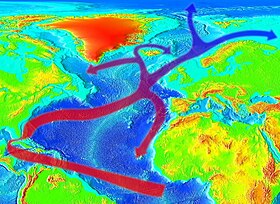In a dire warning that echoes apocalyptic scenarios, more than 40 leading climate scientists have issued an open letter sounding the alarm that the Gulf Stream, a critical ocean current driving warm water across the Atlantic, may be on the brink of collapse. Should this process fail, the consequences could unleash “catastrophic” and irreversible impacts that would last for centuries, reshaping weather patterns and disrupting ecosystems across the globe.
The Gulf Stream, part of the broader Atlantic Meridional Overturning Circulation (AMOC), carries warm water from the eastern United States up to Europe, a process that keeps temperatures in Western Europe much warmer than they would be otherwise. This phenomenon, however, may not be as stable as once believed. Scientists fear that increasing carbon emissions and glacial meltwater are pushing the AMOC to a critical threshold, risking a complete shutdown of the Gulf Stream itself.
“If the AMOC collapses, the entire Atlantic basin and surrounding regions will face extreme and potentially deadly climate shifts,” the scientists wrote, highlighting that regions in Western Europe could see average temperatures drop by as much as 10°C to 15°C (18°F to 27°F). Such an outcome would bring Scotland and northern Europe into an era of frigid temperatures, impacting agriculture, infrastructure, and daily life.
This potential collapse recalls the devastating scenarios portrayed in films like The Day After Tomorrow, where climate collapse leads to an abrupt ice age. While the film is fictional, the scientists emphasize that the real-world impacts would be “no less catastrophic.” The AMOC’s failure could plunge regions of Europe into frigid winters, while monsoon belts and tropical rainfall patterns shift southward, potentially triggering droughts, famines, and weather extremes that would be unprecedented in modern history.
The scientists’ letter points out that the AMOC last collapsed around 12,000 years ago, towards the end of the last Ice Age. Back then, global temperatures plunged, reshaping ecosystems and human societies. Today, the world faces similar risks if the AMOC collapses again, this time driven by human-induced climate change. NASA and other monitoring agencies have detected signs of weakening currents, leading scientists to raise an urgent call for immediate action to curb emissions and mitigate further disruptions.
The warnings arrive as policymakers prepare for another round of climate talks, facing mounting pressure to adopt more stringent climate policies. The scientists urge global leaders to act decisively before the Gulf Stream reaches a point of no return.
Will humanity heed this warning in time, or will we face the severe consequences of ignoring the planet’s signs? Only bold climate action can keep the Gulf Stream flowing and stave off this looming catastrophe.












